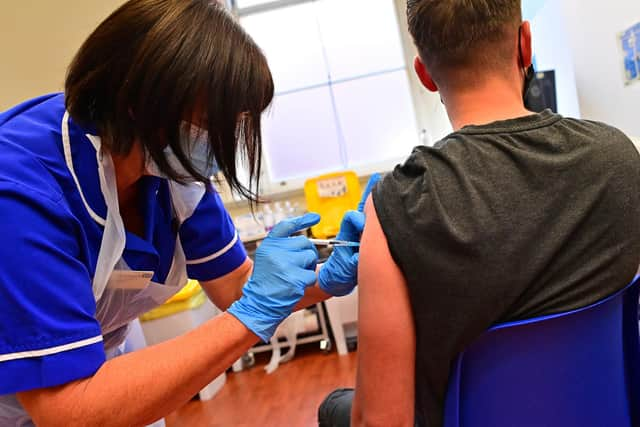Covid Scotland: Some groups at higher Covid risk than others after double vaccine, study finds
Researchers on the study, published in medical journal The Lancet Respiratory Medicine and part of the ongoing EAVE II project, encouraged people to take up the vaccine but stressed it was not 100 per cent effective.
The study, which involved academics at St Andrews, Edinburgh, Glasgow, Aberdeen and Strathclyde Universities, as well as Public Health Scotland, examined health records in Scotland between December 2020 and April 2021.
Advertisement
Hide AdAdvertisement
Hide AdIt found the risk of severe disease from Covid-19 after two vaccine doses was 25 per cent higher for men than women, and that those in their 80s were at five times greater risk than adults under 65.


People with underlying health conditions and living in deprived areas were also at higher risk.
Researchers emphasised that these levels of risk were still far below those of people who had not received a vaccine.
Fewer than one in 10,000 fully vaccinated people were hospitalised or died from Covid-19 in the studied time frame, they said.
Dr Colin McCowan of St Andrews University, a co-lead author on the paper, said the groups most at risk after two vaccine doses are broadly similar to those who were most vulnerable before the vaccine rollout began.
He urged anyone in these groups in particular to adhere to other counter-Covid measures such as mask wearing and hand washing.
“We do really strongly believe that vaccinations are good," he said.
"What we are saying is there is a risk even if you are vaccinated, so you really do need to heed the government advice and you need to think about what you're doing and be careful in your own actions.
Advertisement
Hide AdAdvertisement
Hide Ad“Vaccinations are a very powerful way of fighting against Covid-19, but there are other things that we should be doing as well.”
Dr McCowan stressed that the vaccines should be taken up, as despite not completely removing the risk of severe disease, they greatly reduce it.
“No vaccine is ever 100 per cent effective, and we already knew that the vaccines against Covid-19 weren’t,” he said.
“If you are vaccinated, it has reduced your risk, but there is still a small risk. The vaccines aren’t infallible.”
The study also found that people who had previously had Covid-19 were at lower risk after vaccination.
Further research will examine outcomes for people who contract the virus after their second dose.
“We think it’s related to the idea that if you’ve had a Covid infection, your body has created antibodies to try and fight against it, and those antibodies last for a period of time,” said Dr McCowan.
Professor Aziz Sheikh, Director of Edinburgh University’s Usher Institute and study lead for the EAVE II project, also encouraged vaccine take-up.
Advertisement
Hide AdAdvertisement
Hide Ad"These data… show that the risk of developing severe Covid-19 leading to hospital admission or death after at least one vaccination was – thankfully – very low,” he said.
"Based on this analysis, we would encourage anyone who has not yet been vaccinated to take up the offer as soon as possible.”
A message from the Editor:
Thank you for reading this article. We're more reliant on your support than ever as the shift in consumer habits brought about by coronavirus impacts our advertisers.
If you haven't already, please consider supporting our trusted, fact-checked journalism by taking out a digital subscription.
Comments
Want to join the conversation? Please or to comment on this article.
